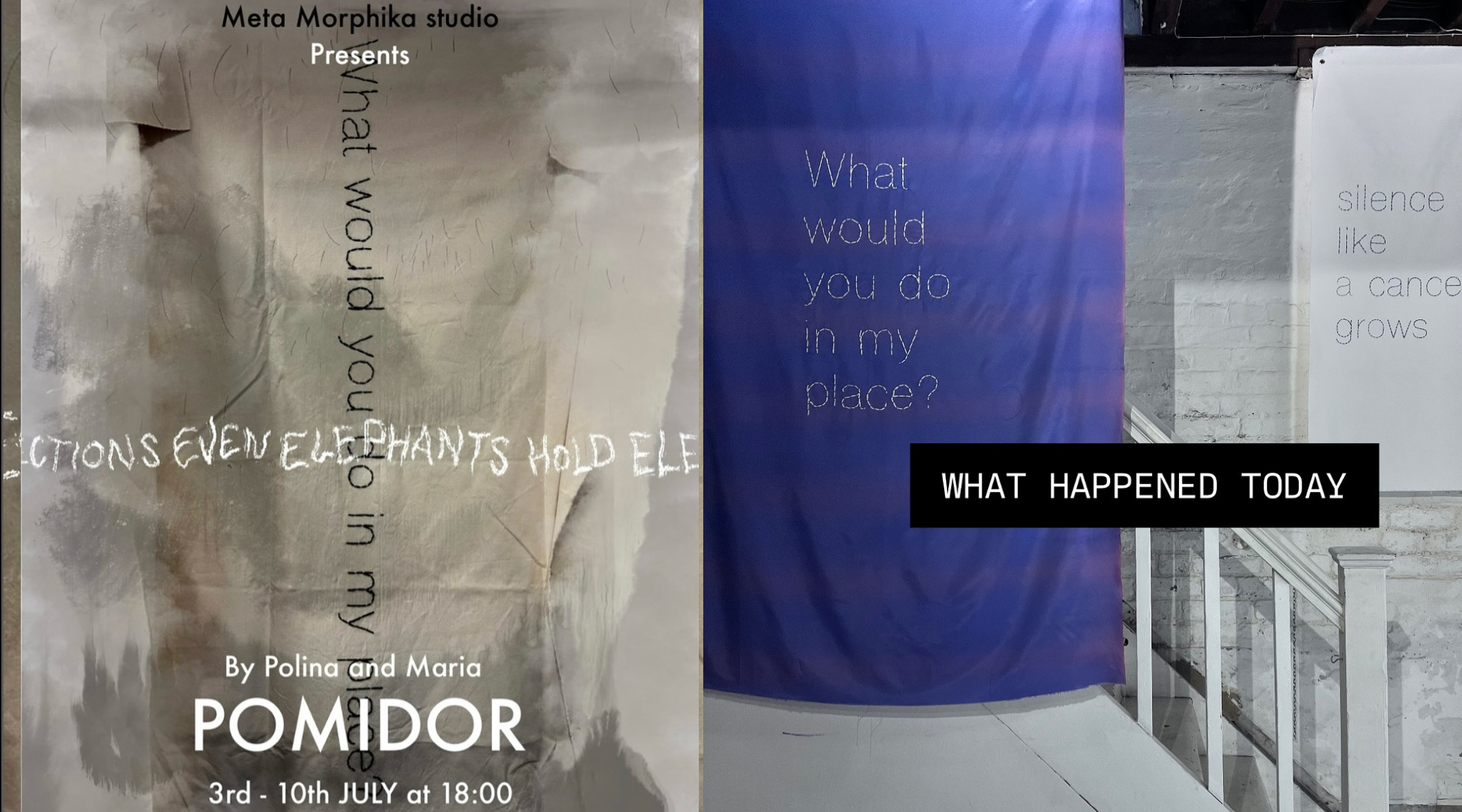London gallery cancels Russian-Israeli artist’s anti-Putin show, objecting to her posts mourning Oct. 7
The Metamorphika studio said the artist’s posts failed to mention Palestinian victims

(L-r) A poster for Pomidor’s exhibit, “Even Elephants Hold Elections,” canceled by the London gallery Metamorphika on July 4, 2024, over an artist’s social media posts mourning the victims of the Oct. 7 attacks; an image shared by Pomidor of the canceled exhibit. (Screenshots via Instagram)
(JTA) — A gallery in London canceled an exhibition about censorship under Vladimir Putin because it objected to social media posts by one of the artists mourning the victims of Hamas’ attack on Oct. 7.
In an Instagram statement posted July 4, Metamorphika studio accused Maria Sarkisyants, who is Jewish and comprises one-half of the artist duo Pomidor, of neglecting the deaths of Palestinians. The exhibition, titled “Even Elephants Have Elections,” had been open for one day.
“As a coalition of artists, founders, and more, we believe in the freedom of occupied Palestine,” the studio wrote. “And we ask our collaborators and artists to condemn oppression in its all [sic] geopolitical contexts without exemptions.”
The statement added, “Some of our members have contacted us sharing their concerns about certain publications by Mrs. Sarkisyants [on her] personal page taking [a] position on the ongoing humanitarian crisis in Palestine.”
The artist, who goes by Maria, told the London Jewish Chronicle the gallery had received complaints about her social media posts. “They said it was wrong that I support Israel,” she said. She added that she had offered to take her name off of the exhibition in order to keep it open, but that the gallery owners had refused.
“The problem came up because Maria is from Israel,” Maria and her partner, Polina Egorushkina, who also goes by her first name, wrote on Instagram in Russian. On another post — accompanying an image of a poster at the exhibition reading “Silence Like A Cancer Grows” — they added, “Why were we allowed to put in so much effort only to have it canceled the opening day?”
The incident was reminiscent of other Israel-related controversies that have swept the art world since Oct. 7. Last fall, the staff of Artforum magazine resigned in protest after their editor was fired for publishing a letter that strongly criticized Israel. In April Israel’s chosen representative artist at the Venice Biennale shut down her country’s pavilion while calling for a ceasefire and the return of hostages — a move that was itself condemned by a pro-Palestinian artist coalition, who argued that Israel never should have been invited to participate in the first place. And last month a Vancouver comics festival banned an artist over her past Israeli military service, before later apologizing.
The London cancellation comes after Maria expressed sympathy for Israel on social media on Oct. 7, the day of Hamas’ attack. She grew up in Russia, where she and Polina founded Pomidor in 2018 before relocating it to the United Kingdom in 2022 following Russia’s invasion of Ukraine. Maria, who holds Israeli citizenship, moved to Israel in 2022 and lived in Ashkelon, one of the coastal cities attacked by Hamas on Oct. 7.
“Israel my beloved, we are here, we are here to support each other, all my thoughts are with the kidnapped,” she wrote in Russian in one post, adding a prayer that they be returned home alive. A month later, she called for Israeli hostages in Gaza to be freed.
Her posts in the aftermath of Oct. 7 remain pinned to her Instagram profile, as does another mourning Russia’s invasion of Ukraine.
The posts were unacceptable to Metamorphika, the studio said, because Maria did not acknowledge the deaths of Palestinians. The gallery suggested that this made the politics of her exhibit, which “confronts the repressive state of Russia,” inconsistent: “We believe that this understanding of brutality and violence shouldn’t stop at one country’s borders.”
The gallery also insisted their decision “has nothing to do with one’s nationality or identity, but with a two [sic] polarized understanding of repression.”
A message from our Publisher & CEO Rachel Fishman Feddersen

I hope you appreciated this article. Before you go, I’d like to ask you to please support the Forward’s award-winning, nonprofit journalism so that we can be prepared for whatever news 2025 brings.
At a time when other newsrooms are closing or cutting back, the Forward has removed its paywall and invested additional resources to report on the ground from Israel and around the U.S. on the impact of the war, rising antisemitism and polarized discourse.
Readers like you make it all possible. Support our work by becoming a Forward Member and connect with our journalism and your community.
— Rachel Fishman Feddersen, Publisher and CEO

























